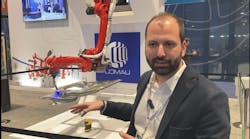QUESTION:
A READER writes, "You usually print just machine automation questions, but how about this one? "Most of us in our company are EEs and MEs; a couple are PEs. The PE label has helped us in the marketplace, if only from time to time. We're a small specialty machine builder with designs on growing out of our currently regional market presence.
"As we bring younger people into the organization, we're of differing opinions about the cost/time/benefit of various certifications we should or could have our degreed and non-degreed employees earn. Our short list includes IEEE's Certified Software Development Professional program, ISA's CAP program and its CCST for technicians, and SME's CMfgE.
"We'd appreciate hearing what other builders think about the value of these (or other) programs."
Send us your comments, suggestions, or solutions for this problem. We'll include them in the March 2006 issue and post them on ControlDesign.com. Send visuals, too -- a sketch is fine.
-- From January 2006 CONTROL DESIGN
ANSWERS:
Training Brings Value
There is definite value in continuing education into your working career. The certifications available provide a good method for doing this. They can be a training tool for an employer and a means of improving your own personal skills.
In today's world, the rate of technology change is fast paced, and you need continued training, just to keep current. For the employee, it shows ambition and dedication to ones profession. A Professional Engineer (PE) brings with it respect for the knowledge it takes and the dedication involved.
I believe the value of a certification to an employer varies depending on the particular industry or business. Certifications are very good qualification credentials. They prove competency in your profession. To a system integrator, the ISA certification is a great method of training. It keys on the automation professional and is very good for marketing your business.
Certifications demonstrate training in best practices for the software cycle (specification, development, verification, etc.). For larger software companies, this also makes them a great training tool. For a smaller group of software engineers in the machinery business, they do provide some training possibilities, but there isn't increased value over other training methods.
My group has more specific needs in training. I would expect this to be true of other machinery manufacturers as well. Most often, the training needs to be on machine functionality. For this, we need to have internal training. Occasionally, Ill have an engineer with expertise in a given area hold sessions with others.
I encourage my group to continue training by taking college courses to learn different techniques or programming languages. Periodically, I have college-credited courses run on site in the evening to learn what we need when it applies. This provides an easy way for employees to continue improving themselves, and helps the company move forward.
I would encourage them to obtain certifications as well. I see certifications as an advantage when hiring, but I don't see them as a major training tool for what our jobs require.
Paul Brancaleone, engineering manager, Software and Controls, Gloucester Battenfield, Gloucester, Mass.
Certainly Certify
Congratulations. Since youre asking "which certification?" and not "if certification," youve already learned that certification usually is worth the time and effort. Each of the programs you identified, CSDP, CAP, CCST and CMfgE, are true certification programs. There are three factors that may help you decide on a certification program: the fit to your work, the qualification requirements, and the recognition by your customers. Review the body of knowledge for each of the programs. These knowledge areas, or domains, are identified along with the specific knowledge or skills required and the percentage of the certification exam based on that knowledge domain. Compare the knowledge and skill profiles of the different programs and you should be able to determine the best fit to your organization.
Each program also has sample tests available. Check the qualification requirements for each of the programs. CSDP and CAP both require four-year degrees, though not engineering degrees, and about five years of experience. CCST and CMfgT require work experience. CMfgE requires some combination of education and experience. There are few certification options for those without at least five years of experience.
The value of certification is partially developmental and partially a return on investment. Ask your customers which programs they recognize. Most likely, any certification will impress them because it means that your company values quality individuals. If one certification is more recognized than the others because of the fit to your industry, then thats likely the one with a higher return.
Nicholas Sands, CAP process control technology manager, DuPont Chemical Solutions
Certifcation Means Plenty
Since 1972, Certified Manufacturing Engineers (CMfgE) has been testing individuals on a comprehensive knowledge of manufacturing processes and practices, including product and tool design, facility operations, floor operations, and material handling.
As the certifying body, SME is held to rigorous standards to ensure certification integrity. Bodies of knowledge for every certification are periodically evaluated by industryatlarge through qualitative and quantitative study, and updated as indicated by the market, which makes SMEs certification products nationally normed, meaning theyre relevant regardless of location.
This continuous improvement process and national norming differentiate a true certification exam from a certificate program exam. SME Certification offers many benefits to companies. Some of the advantages for organizations include: nationally normed exams that test knowledge, application, and judgment topics; usability as a tool to assess training and development needs and to identify internal "fast trackers;" and valuable reports on tested employees to identify core competencies and key training needs. In addition, theres the ability to customize a training program to meet the knowledge gaps you identify; unbiased validation of staff knowledge and skills to showcase to your customers; and positioning of your company among an elite group of professional organizations that use certification to stand apart from their competition.
Jeannine Kunz, manager of certification, SME, Dearborn, Mich.
SEND US YOUR COMMENTS,
SUGGESTIONS OR SOLUTIONS
Mays Problem
How Do We Measure Velocity of Fragile Solids?
"We build control systems for pneumatic conveying systems. An upcoming project involves conveying very friable materials in a system designed to minimize particle denigration. We need to measure material velocity and flow rate at several key positions to ensure material isn't building up. System pressure doesn't tell us enough. I'm not sure we can put a probe inside the 2-in. stainless-steel tube. Any suggestions for an internal or external solution?"
Send us your comments, suggestions, or solutions for this problem. Well include it in the May 2006 issue and post it on ControlDesign.com. Send visuals, tooa sketch is fine. E-MAIL us at [email protected] or mail to The Answer to Your Problems, CONTROL DESIGN, 555 W. Pierce Road, Suite 301, Itasca, IL 60143. You can also fax to 630/467-1124. Please include your company, location and title in the response. Have a problem you'd like to pose to readers? Send it along, too.
POSE A QUESTION

Leaders relevant to this article:




